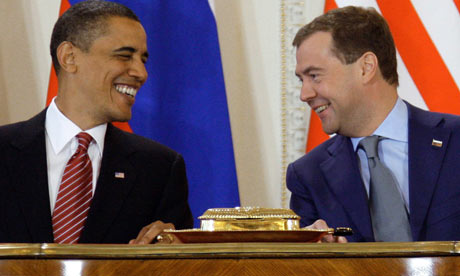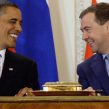
Moscow Signs the Nuclear Arms Treaty: Raising Hope for Additional Progress
Publication: Eurasia Daily Monitor Volume: 7 Issue: 68
By:

Today in the Czech capital Prague, Presidents, Barack Obama, and Dmitry Medvedev, signed a new treaty to replace the 1991 Strategic Arms Reduction Treaty (START) that expired last December. Within seven years of the new treaty being ratified by the US Senate and the Russian parliament, the number of operationally deployed strategic nuclear warheads on each side must be below 1,550, and the number of intercontinental delivery systems will be 800 for each (Interfax, April 2).
According to the Russian Foreign Minister, Sergei Lavrov, “Both sides have already fulfilled all obligations under START and the 2002 Moscow treaty” (www.mid.ru, April 6). This would imply that the number of operationally deployed strategic warheads on each side is today under 2,200. Western experts tend to believe that Russia may have around 2,600 (AP, March 25), but, most likely Lavrov’s estimate is more accurate. Old Russian Intercontinental Ballistic Missiles (ICBM’s), heavy bombers and nuclear submarines, produced during the Cold war and in the early 1990’s, are being decommissioned, while the defense industry is struggling and often failing to replace them with more modern versions. The most dramatic example of the current Russian strategic nuclear arms frustration is the Bulava (SS-NX-30) sea-based ICBM that has failed in seven of its twelve tests since 2004. The Russian navy is building four new nuclear submarines of the Borey class to be fitted with the Bulava and over 40 percent of the entire defense budget is being spent on the project. The first Borey submarine must be fully ready for service this year, but no one in Russia knows for sure, when and if the Bulava will be ready (RIA Novosti, April 6).
As its strategic nuclear arsenal is unraveling, Moscow has a compelling strategic reason to sign a new nuclear arms reduction treaty with Washington. The number of Russian nuclear weapon delivery systems, both strategic and shorter range, is declining as the Soviet arsenal becomes obsolete. To maintain a credible nuclear deterrent on a par with Washington, Moscow needs a legally-binding treaty to ensure that the US will also reduce its arsenal corresponding to its own inevitable reduction. In order to achieve this goal, Moscow eventually conceded that the new treaty will not explicitly limit future US Ballistic Missile Defense (BMD) development and will allow non-nuclear intercontinental weapons the US may deploy to promptly attack terrorists or rogue Weapons of Mass Destruction (WMD) sites worldwide. Lavrov announced, “We believe non-nuclear strategic attack weapons to be destabilizing,” but such weapons will be permitted as part of the overall quota of warheads and delivery systems under the new treaty (www.mid.ru, April 6).
Lavrov officially admitted that the announced plans by the Obama administration to deploy theater BMD interceptors in Romania and other European nations do not threaten Russia, since these systems cannot intercept Russian ICBM’s and are aimed at medium range missiles that Iran has, and Russia does not. Lavrov declared that if, in the future, the US develops strategic BMD capabilities that may threaten the Russian nuclear deterrent, Moscow may respond by abandoning the new treaty. However, Lavrov stressed that any international treaty has a standard clause that allows a signatory sovereign nation to abrogate, if its national security is threatened. The threat to withdraw from the treaty is mostly for internal consumption and Moscow will not willingly abandon it. As Lavrov said: “The treaty serves Russian national interests and does not impede American ones” (www.mid.ru, April 6). Moscow ultimately wants Washington to restore some semblance of the 1972 ABM treaty that limits BMD and was abrogated in 2002. Meanwhile, Russia is ready to settle for a tacit assurance that there are no plans to deploy in the foreseeable future, any BMD elements that may actually threaten the Russian nuclear deterrent.
As Russia is transforming from a former global nuclear superpower to a regional great power, maintaining its nuclear deterrent capability is seen as the overruling strategic objective. Only a credible nuclear deterrent is considered in Moscow as a sufficient guarantee that the US will keep out of the Russian sphere of privileged interests, allowing the present authoritarian regime a free hand in internal politics and in dealing with neighboring states. This stance flies in the face of Obama’s announced goal of full nuclear disarmament, but no one in Moscow takes the so called “global zero” seriously.
Today, Moscow’s greatest fear is that the US Senate will stall and fail to ratify the new treaty. Medvedev’s foreign policy aide, Sergei Prikhodko, complained that both sides have underestimated the influence of “hawks” that want to increase bilateral tension. The Russian parliament will surely rubberstamp anything the Kremlin wants, but in the US Senate there may be many questions: the new treaty has less intrusive verification measures than the previous START, and telemetric data about ICBM test launches will be exchanged on a voluntary basis, whereas previously it was all open. The Chairman of the Federation Council Foreign Relations Committee, Mikhail Margelov, told journalists that during, and after, the nuclear summit next week in Washington, the Russian delegation plans to lobby the Senate, the administration, and Republican think-tanks, to convey the idea that ratification of the new treaty is in everyone’s interest and not a partisan issue (Kommersant, April 5).
The 1991 START reversed the Cold War arms race. Now, there is no arms race, while Russia and the US will most likely continue nuclear disarmament with or without a new treaty. The signing ceremony in Prague has improved the atmosphere of US-Russian relations, but the fate of the treaty itself also depends on the overall political atmosphere. There are numerous variables involved, such as: if there is a new flare-up between Russia and Georgia, then the treaty will be dead, or if Moscow finally ships S-300 antiaircraft missiles to Iran it will stall in the Senate. A diffusion of many other bilateral contentious issues is urgently needed for the Prague signing atmosphere to last. Russian lobbying in Washington, by itself, is not enough.




